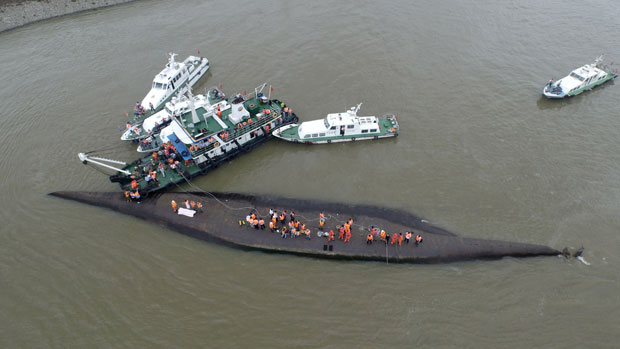China ferry disaster: 'no chance of anyone alive'
Only 14 out of 456 people are known to have survived one of China's worst shipping disasters

A free daily email with the biggest news stories of the day – and the best features from TheWeek.com
You are now subscribed
Your newsletter sign-up was successful
Officials in China have suggested there is "no chance" of finding any more Eastern Star passengers alive after one of the country's worst shipping disasters in more than 60 years.
The 2,200-tonne ship, which overturned in a storm on Monday night, has been righted overnight but the majority of passengers are still missing.
Only 14 of the 456 people on board are known to have survived and so far only 97 bodies have been recovered.
The Week
Escape your echo chamber. Get the facts behind the news, plus analysis from multiple perspectives.

Sign up for The Week's Free Newsletters
From our morning news briefing to a weekly Good News Newsletter, get the best of The Week delivered directly to your inbox.
From our morning news briefing to a weekly Good News Newsletter, get the best of The Week delivered directly to your inbox.
A Transport Ministry spokesman told reporters last night that the "overall judgment" was that "there is no chance of people being alive".
The rescue mission has now become an operation to recover hundreds of bodies, says Sky News.
Steel bars, placed underneath the ship by divers, are helping two 500-tonne cranes lift the vessel, which is still carrying a lot of water, while huge nets are being used to catch any bodies.
"The Eastern Star's rapid and complete submersion in a muddy waterway has slowed search efforts," says the [2]South China Morning Post. The Chinese ferry capsized completely within minutes, submerging all cabins, while visibility for divers was cut to "less than a metre" as flooding upstream stirred up mud and sand, says the newspaper.
A free daily email with the biggest news stories of the day – and the best features from TheWeek.com
One water rescue expert from the Dalian Maritime University in Shandong province told China Central Television: "The divers could only feel their way with their hands to try to find survivors."
The ferry's captain and chief engineer were among the handful of survivors, some of whom managed to swim ashore, while three were pulled out from air pockets within the overturned hull.
The BBC says the disaster could become China's deadliest boat accident since the SS Kiangya sank off Shanghai in 1948, killing more than 2,750 people.
Chinese ferry disaster: cries heard from overturned hull
02 June
Rescuers searching for passengers of an overturned Chinese ferry say they have heard "sounds of life" from within the hull.
In what is already being described as one of China's worst shipping disasters, the Eastern Star ferry reportedly sank with more than 450 people on board after it was caught in a storm yesterday evening on the Yangtze River.
Only a handful of people have been accounted for: six bodies have been recovered, a few people managed to swim ashore and several people have been rescued. The captain and chief engineer were among the survivors and have been detained by police for questioning.
Rescue teams have described seeing "hats and shoes floating in the water" when they first arrived to the scene.
The ship is now said to be resting upside down in 15 metres of water in Jianli county. "Search teams seen banging on the upturned hull of the ship with a hammer said they had heard sounds of life," reported Sky News. Rescuers have apparently been trying to cut through the hull with an angle grinder.
One 65-year-old woman was pulled from the vessel around 14 hours after it capsized. China's Premier Li Keqiang, who is at the scene, described her survival as a "miracle".
Another man survived in the water for ten hours, despite not being able to swim. Tour guide Zhang Hui, who gripped onto a branch to stop himself from drowning, told the Xinhua news agency: "Wave after wave crashed over me; I swallowed a lot of water."
More than 100 boats are said to be involved in the search, but bad weather is hindering rescue efforts. A nearby dam has reportedly had its turbines slowed down to reduce the speed of the river's current.
The large majority of the passengers were said to be tourists, with some older than 80 and the youngest born in 2012. Many were said to be in their 60s and 70s.